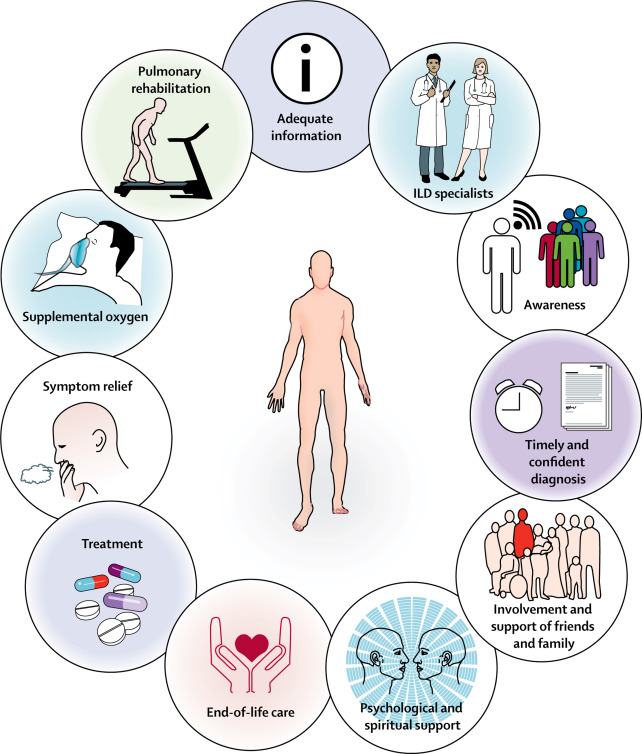Our official English website, www.x-mol.net, welcomes your
feedback! (Note: you will need to create a separate account there.)
Palliative care in interstitial lung disease: living well.
The Lancet ( IF 98.4 ) Pub Date : 2017-12-01 , DOI: 10.1016/s2213-2600(17)30383-1 Michael Kreuter , Elisabeth Bendstrup , Anne-Marie Russell , Sabrina Bajwah , Kathleen Lindell , Yochai Adir , Crystal E Brown , Greg Calligaro , Nicola Cassidy , Tamera J Corte , Klaus Geissler , Azza Adel Hassan , Kerri A Johannson , Ronaldo Kairalla , Martin Kolb , Yasuhiro Kondoh , Sylvia Quadrelli , Jeff Swigris , Zarir Udwadia , Athol Wells , Marlies Wijsenbeek
The Lancet ( IF 98.4 ) Pub Date : 2017-12-01 , DOI: 10.1016/s2213-2600(17)30383-1 Michael Kreuter , Elisabeth Bendstrup , Anne-Marie Russell , Sabrina Bajwah , Kathleen Lindell , Yochai Adir , Crystal E Brown , Greg Calligaro , Nicola Cassidy , Tamera J Corte , Klaus Geissler , Azza Adel Hassan , Kerri A Johannson , Ronaldo Kairalla , Martin Kolb , Yasuhiro Kondoh , Sylvia Quadrelli , Jeff Swigris , Zarir Udwadia , Athol Wells , Marlies Wijsenbeek

|
Progressive fibrotic interstitial lung diseases (ILDs) are characterised by major reductions in quality of life and survival and have similarities to certain malignancies. However, palliative care expertise is conspicuously inaccessible to many patients with ILD. Unmet patient and caregiver needs include effective pharmacological and psychosocial interventions to improve quality of life throughout the disease course, sensitive advanced care planning, and timely patient-centred end-of-life care. The incorrect perception that palliative care is synonymous with end-of-life care, with no role earlier in the course of ILD, has created a culture of neglect. Interventions that aim to improve life expectancy are often prioritised without rigorous assessment of the individual's health and psychosocial needs, thereby inadvertently reducing quality of life. As in malignant disorders, radical interventions to slow disease progression and palliative measures to improve quality of life should both be prioritised. Efficient patient-centred models of palliative care must be validated, taking into account religious and cultural differences, as well as variability of resources. Effective implementation of palliative care for ILD will require multidisciplinary participation from clinicians, specialist nurses, psychologists, social workers, and, in some countries, non-governmental faith and community-based organisations with access to palliative care expertise.
中文翻译:

间质性肺疾病的姑息治疗:生活良好。
进行性纤维化间质性肺病(ILD)的特点是生活质量和生存率大大降低,并且与某些恶性肿瘤相似。但是,许多ILD患者显然无法获得姑息治疗专业知识。未满足的患者和护理人员需求包括有效的药理和社会心理干预措施,以改善整个疾病过程中的生活质量,敏感的高级护理计划以及及时的以患者为中心的临终护理。姑息治疗与临终护理同义的错误观念在ILD的早期阶段没有作用,这造成了一种忽视的文化。在没有严格评估个人健康和心理需求的情况下,通常会优先考虑旨在提高预期寿命的干预措施,从而无意中降低了生活质量。与恶性疾病一样,应优先考虑采取慢速干预措施以减缓疾病的进展,并应采取姑息措施以改善生活质量。考虑到宗教和文化差异以及资源的可变性,必须验证以患者为中心的高效姑息治疗模型。有效实施ILD的姑息治疗将需要临床医生,专科护士,心理学家,社会工作者以及在某些国家(包括某些国家)具有姑息治疗专业知识的非政府信仰和社区组织的多学科参与。考虑到宗教和文化差异以及资源的可变性,必须验证以患者为中心的高效姑息治疗模型。有效实施ILD的姑息治疗将需要临床医生,专科护士,心理学家,社会工作者以及在某些国家(包括某些国家)具有姑息治疗专业知识的非政府信仰和社区组织的多学科参与。考虑到宗教和文化差异以及资源的可变性,必须验证以患者为中心的高效姑息治疗模型。有效实施ILD的姑息治疗将需要临床医生,专科护士,心理学家,社会工作者以及在某些国家(包括某些国家)具有姑息治疗专业知识的非政府信仰和社区组织的多学科参与。
更新日期:2017-10-13
中文翻译:

间质性肺疾病的姑息治疗:生活良好。
进行性纤维化间质性肺病(ILD)的特点是生活质量和生存率大大降低,并且与某些恶性肿瘤相似。但是,许多ILD患者显然无法获得姑息治疗专业知识。未满足的患者和护理人员需求包括有效的药理和社会心理干预措施,以改善整个疾病过程中的生活质量,敏感的高级护理计划以及及时的以患者为中心的临终护理。姑息治疗与临终护理同义的错误观念在ILD的早期阶段没有作用,这造成了一种忽视的文化。在没有严格评估个人健康和心理需求的情况下,通常会优先考虑旨在提高预期寿命的干预措施,从而无意中降低了生活质量。与恶性疾病一样,应优先考虑采取慢速干预措施以减缓疾病的进展,并应采取姑息措施以改善生活质量。考虑到宗教和文化差异以及资源的可变性,必须验证以患者为中心的高效姑息治疗模型。有效实施ILD的姑息治疗将需要临床医生,专科护士,心理学家,社会工作者以及在某些国家(包括某些国家)具有姑息治疗专业知识的非政府信仰和社区组织的多学科参与。考虑到宗教和文化差异以及资源的可变性,必须验证以患者为中心的高效姑息治疗模型。有效实施ILD的姑息治疗将需要临床医生,专科护士,心理学家,社会工作者以及在某些国家(包括某些国家)具有姑息治疗专业知识的非政府信仰和社区组织的多学科参与。考虑到宗教和文化差异以及资源的可变性,必须验证以患者为中心的高效姑息治疗模型。有效实施ILD的姑息治疗将需要临床医生,专科护士,心理学家,社会工作者以及在某些国家(包括某些国家)具有姑息治疗专业知识的非政府信仰和社区组织的多学科参与。











































 京公网安备 11010802027423号
京公网安备 11010802027423号